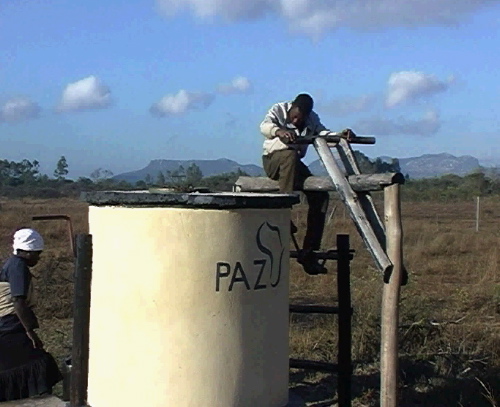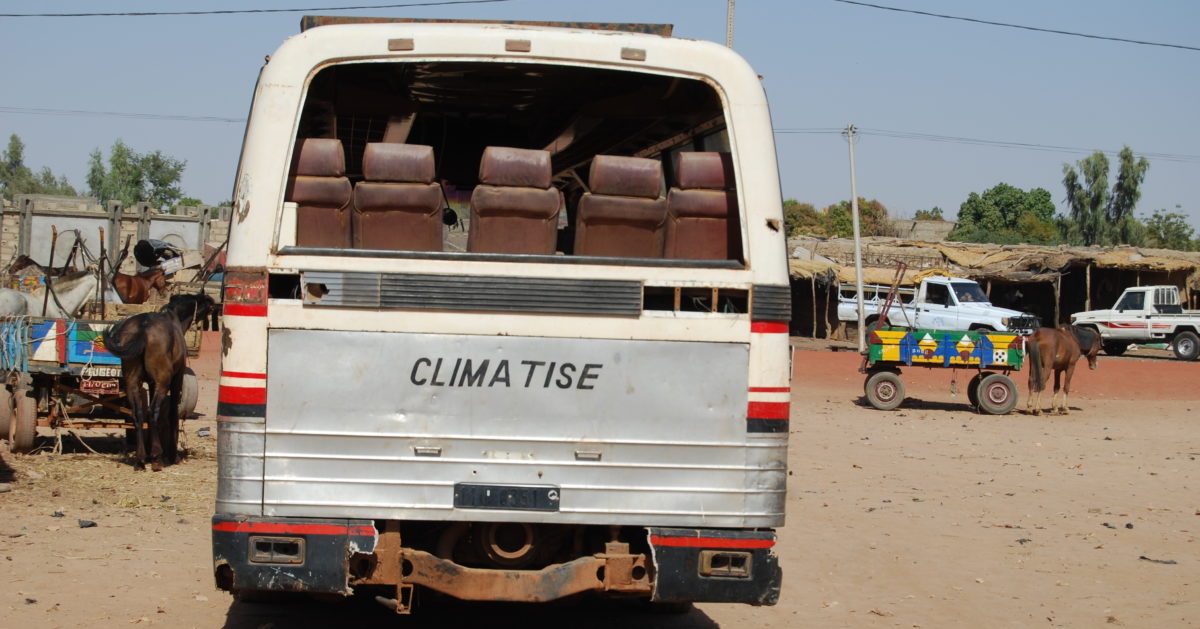Here’s an interesting simple, low-maintenance technology:
“Elephant Pumps” that were introduced to rural areas in Zimbabwe and Malawi during the last few years. These rather simple, enhanced rope pumps (based on an ancient Chinese technology) where designed for use in rural areas, where the supply of readymade spare parts isn’t that easy.

Now, what makes the Elephant Pump so different from the other popular low-maintenance pump “Afripump” is that it’s locally assembled and maintainable by the local community. Both systems – Afripump and Elephant Pump – may have their pro & cons (80-100m depth, high durability, low-maintenance vs. <40m depth, simple design, cheaper), but I especially like the “bicycle option” added to pumps which were built for schools:
On school pumps Pump Aid often incorporates a “bicycle” system onto the Elephant Pump since this has proved enormously popular with children. Most children in Zimbabwe have never had the chance to ride a bicycle so can even come to school early to “play” on the pump thereby helping to fill the school water tanks. The job of collecting water, once a tiresome chore, becomes fun and children no longer have to leave their classrooms to walk miles carrying buckets of water on their heads from a distant muddy pool.
The British Charity Org “Pump Aid“, which has in the past introduced and promoted these systems in Zimbabwe and Malawi for the costs of GBP 250 (~ USD 460, EUR 310) each, also created a very informative video on how the technology actually works:
“The Elephant Pump yields about one litre of clean water every second for an average well depth of 20 metres.”
It’s simple, it works, it wins! 🙂
[h/t NextBillion.net]


This is excellent! It always surprises me how schools and other institutions are totally dependent on water. I pass school kids every day carrying a jerry can of water to school to tip into the school tank, and a piece of wood for the fire that will cook the school lunch. The wood collection is leading to deforestation, and the water collected is generally polluted. While at Bamburi Cement we introduced a project to harvest rainwater in tanks built by teachers/parents and managed by the kids which led to better hygiene overall, and tree planting to provide future energy needs. The bottle of water was still brought in and fed to the trees. The Green School project planted over half a million trees per year in schools and had a survival rate of over 85% in some schools totally transforming the schools appearance.
The gas cylinder was probably steel, not iron. Lead would be an unusual alloying metal.
I though this might be of interest to everyone, AFricanado 2008 – is a forum to discuss and showcase appropriate technologies and inventions in the sectors of energy, health, education, transportation, communication, water and irrigation as well as thrift and banking that can be made available to improve living conditions in rural communities in Africa.
http://www.democracy-africa.org/africando2008/afriCANDO_2008.pdf
Only 20 days left to register.
Yay for Zimbabwe & Malawi! Good stuff – very interesting!
Thank you for bringing the Elephant Pump to your readers’ attention.
Currently over 80 Elephant Pumps are built each month, which result in 20,000 additional people benefiting from access to clean water. Over 5,000 Elephant Pumps have been built across Zimbabwe, Malawi and Liberia giving clean, accessible water to over 1.3 million people.
Our Elephant Pumps cost a tenth of what other pumps can cost and are just as effective. Approximately 90% of Elephant Pumps are in operation at any one time – this compares to 50% of piston pumps.
Furthermore, when a Pump is built, beneficiaries receive a training workshop so that they can maintain the Pump using easy to find materials such as plant fibres.
To improve health further and provide a source of income generation alongside every Pump, Pump Aid establishes a nutrition garden which is irrigated using overflow water from the Pump. These nutrition gardens can be used to grow vegetables so the people can enjoy a healthy diet and grow enough produce to sell at local markets. Productive trees are also planted to combat deforestation, improve soil cover and increase re-infiltration rates when rains come, ensuring the long term sustainability of ground water supplies. Agricultural training is given when planting the nutrition gardens, ensuring the gardens are maintained by the communities themselves.
Pump Aid has recently been chosen as the UK NGO partner to Live Earth 2010. On April 18th 2010 Live Earth returns, turning its attention and significant influence onto the global water challenge. The Live Earth Run for Water global events on 18th April 2010 will be the single biggest fundraising effort for water causes in history. Nearly 1 billion people across the world do not have access to clean water impacting on poverty and increasing disease – around 4,000 children die every day from dirty water. More than 100 countries across the globe will participate in raising money for water causes by staging 6 kilometer run/walk events. London and Manchester will be hosting the UK events with all the funds raised going straight to Pump Aid projects.
£500 is all it takes to build an Elephant Pump which can give 250 people a continuous supply of clean and disease-free water for life. Our goal is to get at least 14,000 people in the UK taking part in Run for Water. If everyone could raise £500 in sponsorship, Pump Aid could help 3.5 million more people – that’s the size of the population of Liberia.
The potential is massive so please get involved.
Really good solid article so fascinating reading so primitive way but its works